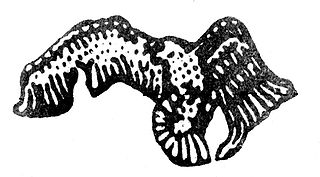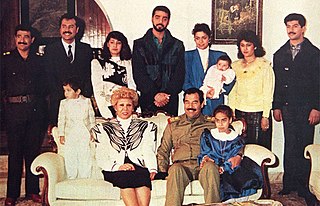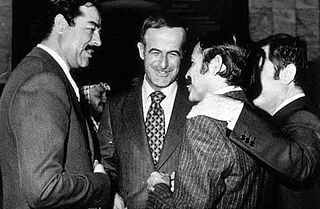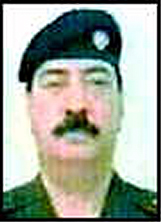
Izzat Ibrahim al-Douri was an Iraqi politician and army field marshal. He served as Vice Chairman of the Iraqi Revolutionary Command Council until the 2003 U.S. invasion of Iraq and was regarded as the closest advisor and deputy under President Saddam Hussein. He led the Iraqi resistance group Naqshbandi Army.

The Revolutionary Command Council was the ultimate decision-making body in Ba'athist Iraq. Established after the 1968 Iraqi coup, It exercised both executive and legislative authority in the country, with the Chairman and Vice Chairman chosen by a two-thirds majority of the council. The Chairman was also then declared the President of Iraq and he was then allowed to select a Vice President. After Saddam Hussein became President of Iraq in 1979 the council was led by deputy chairman Izzat Ibrahim ad-Douri, deputy Prime Minister Tariq Aziz, and Taha Yassin Ramadan, who had known Saddam since the 1960s.

Al-Awda is an Arab socialist political party in Iraq. Al-Awda's name began appearing in Iraq in June 2003 in anti-occupation graffiti and leaflets in Baghdad and to the north and west of the capital. The group is led by Mohammed Younis al-Ahmed, who is based in Syria.

Arab Liberation Front is a minor Palestinian political party, previously controlled by the Iraqi Ba'ath Party, which it founded in 1969 as its Palestinian military wing. It was based out of Iraq and trained by the Iraqi army. The ALF was from its foundation a member of the Palestine Liberation Organization (PLO). Its membership was not limited to Palestinians, as its senior leadership roles included several Lebanese and Jordanian volunteers.
Jeish Muhammad is an Iraqi militant group that is both politically and religiously motivated. The politically motivated faction within JM is primarily made up of former Ba'athist members mainly from the Sunni region. Many who enjoyed special status during the leadership of Saddam Hussein were from Tikrit, which is in turn within an area of Iraq where the Arab population is mostly Sunni. People who generally hold the ex-vice-president, Izzat Ibrahim ad-Douri, in exceptionally high esteem were members of the security, intelligence and police forces from the previous government.
The Directorate of General Security (DGS) also known as Internal State Security was a domestic Iraqi intelligence agency.

Ba'athist Iraq, officially the Iraqi Republic (1968–1992) and later the Republic of Iraq (1992–2003), was a Ba'athist one party state between 1968 and 2003 under the rule of the Arab Socialist Ba'ath Party. This period began with high economic growth, but ended with the country facing severe levels of socio-political isolation and economic stagnation. By the late 1990s, the average annual income had decreased drastically due to a combination of external and internal factors. UNSC sanctions against Iraq, in particular, were widely criticized for negatively impacting the country's quality of life, prompting the establishment of the Oil-for-Food Programme. The Ba'athist period formally came to an end with the 2003 invasion of Iraq, and the Ba'ath Party has since been indefinitely banned across the country.

The Army of the Men of the Naqshbandi Order, also known as the Naqshbandi Army, is one of a number of underground Ba'athist militant insurgency groups fighting U.S.-led Coalition forces in Iraq. Media frequently refers to the group by the initials JRTN, a romanization of its Arabic name. Supreme Command for Jihad and Liberation, technically the name of the umbrella organization to which JRTN belongs, is also often used to refer to JRTN specifically.

The Arab Socialist Ba'ath Party, also referred to as the pro-Iraqi Ba'ath movement, was a Ba'athist political party, which was headquartered in Baghdad, Iraq, until 2003. It is one of two parties which emerged from the 1966 split of the original Ba'ath Party.

The Arab Socialist Ba'ath Party of Algeria, is a political party in Algeria. It is the Algerian regional branch of the Iraqi-led Ba'ath Party. It is led by Ahmed Choutri.

The Arab Socialist Ba'ath Party – Iraq Region, officially the Iraqi Regional Branch, is an Iraqi Ba'athist organisation founded in 1951 by Fuad al-Rikabi. It was the Iraqi regional branch of the original Ba'ath Party, before changing its allegiance to the Iraqi-dominated Ba'ath movement following the 1966 split within the original party.

The Tunisian Ba'ath Movement is a political party in Tunisia. It is the Tunisian regional branch of the Iraqi-led Ba'ath Party.

Abd al-Khaliq al-Samarra'i was an Iraqi Ba'athist politician and leading member of the Arab Socialist Ba'ath Party in Iraq. He was a member of the Regional Command from 1964 to 1973, and considered a serious rival of Saddam Hussein for leadership of the civilian faction of the Ba'ath Party. He was arrested in 1973 for his alleged involvement in a plot to overthrow the government, and executed in 1979 by Hussein.

Ra'ad Majid Rashid al-Hamdani is a retired Iraqi military officer and former General of the Iraqi Republican Guard, and was one of Saddam Hussein's favourite generals.

The Tulfah family was the family of Saddam Hussein of Ba'athist Iraq who ruled from 1979 to 2003 and established a single party authoritarian government under the control of the Ba'ath Party until the 2003 invasion of Iraq.
Fawzi Mutlaq al-Rawi, also known as Fawzi Isma'il al-Husayni al-Rawi, Abu Akram, or Abu Firas, was allegedly, according to the US, the leader of the Syrian led Ba'athist movement in Iraq.

The Faith Campaign was an Islamist campaign conducted by the Iraqi Ba'ath Party, beginning in 1993. The campaign involved a variety of policies, including greater freedoms being granted to Islamist groups, greater resources being put into religious programmes, increased use of Islamic punishments, and a greater emphasis being put on Islam in all sectors of Iraqi life.

The 1979 Ba'ath Party Purge, also called the Comrades Massacre, was a public purge of the Iraqi Ba'ath Party orchestrated on 22 July 1979 by then-president Saddam Hussein six days after his arrival to the presidency of the Iraqi Republic on 16 July 1979.

Muhyi Abdul-Hussein Mashhadi was an Iraqi Ba'athist politician and leading member of the Arab Socialist Ba'ath Party in Iraq. He was a member of the Regional Command and the Revolutionary Command Council and also was the secretary of President Ahmed Hassan al-Bakr.

The Assadist–Saddamist conflict, also known as the Ba'ath Party intraconflict, was a conflict between the Assadist Syrian-led Ba'ath Party and its subgroups, loyal to Ba'athist Syria, and the Saddamist Iraqi-led Ba'ath Party and its subgroups, loyal to Ba'athist Iraq.













